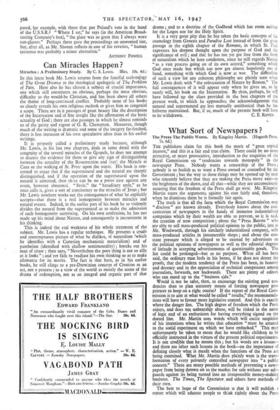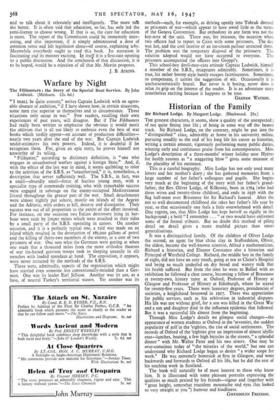What Sort of Newspapers ?
THE publishers claim for this book the merit of " great topical interest," and this is a fair and true claim. There could be no more attractive, or more provocative, introduction to the enquiries of the Royal Commission on " tendencies towards monopoly " in the newspaper Press. Nobody wants a censorship of the Press ; nobody is so foolish as to want a Press owned or controlled by the Government ; but the way to these things may be opened up by men who sincerely believe that they are making the Press move east—to the brightness of the dawn, and all that—while they are unconsciously securing that the freedom of the Press shall go west. Mr. Kingsley Martin states the arguments against his case fairly and, therefore, when he dismisses them he is formally fair again.
The truth is that all the facts which the Royal Commission may " disclose " are known already. Everybody knows about the con- centration of newspapers in die hands of immense industrialised companies which by their wealth are able to prevent, so it is said, the creation of new competition ; about the "Press Barons " who are able to sell mass-produced political opinion to the public, just as Mr. Woolworth, through his similarly industrialised company, sells mass-produced articles in innumerable shops • and about the con- stant pressure which is alleged to be exerted by advertisers on the political opinions of newspapers as well as the editorial degrees of latitude in accepting advertisements of questionable goods. The list could be prolonged—but to no purpose, When all has been said, the ordinary man feels in his bones, if he does not detect the proofs, that the modern tendency of the Press has been, in honesty and decency and in the appreciation of technical competence among journalists, forwards, not backwards. There are plenty of editors who can stand up to the " business side."
Would it not be safer, then, to encourage the existing good ten- dencies than to plan statutory means of forcing newspaper pro- prietors to keep on a right course? If the report of the Royal Com- mission is to aim at what would be called "results," the recommenda- tions will have to favour more legislative control. And this is exactly where the danger lies. The high degree of freedom which the Press enjoys, and does not unbearably abuse, will be risked in the name of logic and of an enthusiasm for having everything signed on the dotted line. Mr. Martin uses words which will excite suspicion of his intentions when he writes that education "must be attuned to the social experiment on which we have embarked." This may unfortunately be taken to mean that he would like children to be officially instructed in the virtues of the present political experiments. It is not credible that he means this - but his words are a lesson— and there are other such lessons in die book—on the importance of defining closely what is meant when the functions of the Press are being examined. What Mr. Martin does plainly want is the trans- formation of every privately controlled newspaper into " a public concern." These are many possible methods of preventing a news- paper from being thrown on to the market for sale without any safe- guards against its being turned into an irresponsible money-making business. The Times, The Spectator_ and others have methods of their own.
The best to hope of the Commission is that it will publish a report which will educate people to think rightly about the Press and to talk about it relevantly= and intelligently. The more talk the better. It is often said that education, so far, has only led the semi-literate to choose wrong. If that is so, the cure for education is more. The report of the Commission could be immensely inter- esting, and also important, if it simply administered a dose of common sense and left legislation alone—Of course, explaining why. Meanwhile everybody ought to read this book. Its narration is fascinating and its manner exciting. In itself it is a first-rate opening to a public discussion. And the conclusion of that discussion, it is to be hoped, would be a rejection of all that Mr. Martin proposes.
J. B. AnuNs.



































 Previous page
Previous page